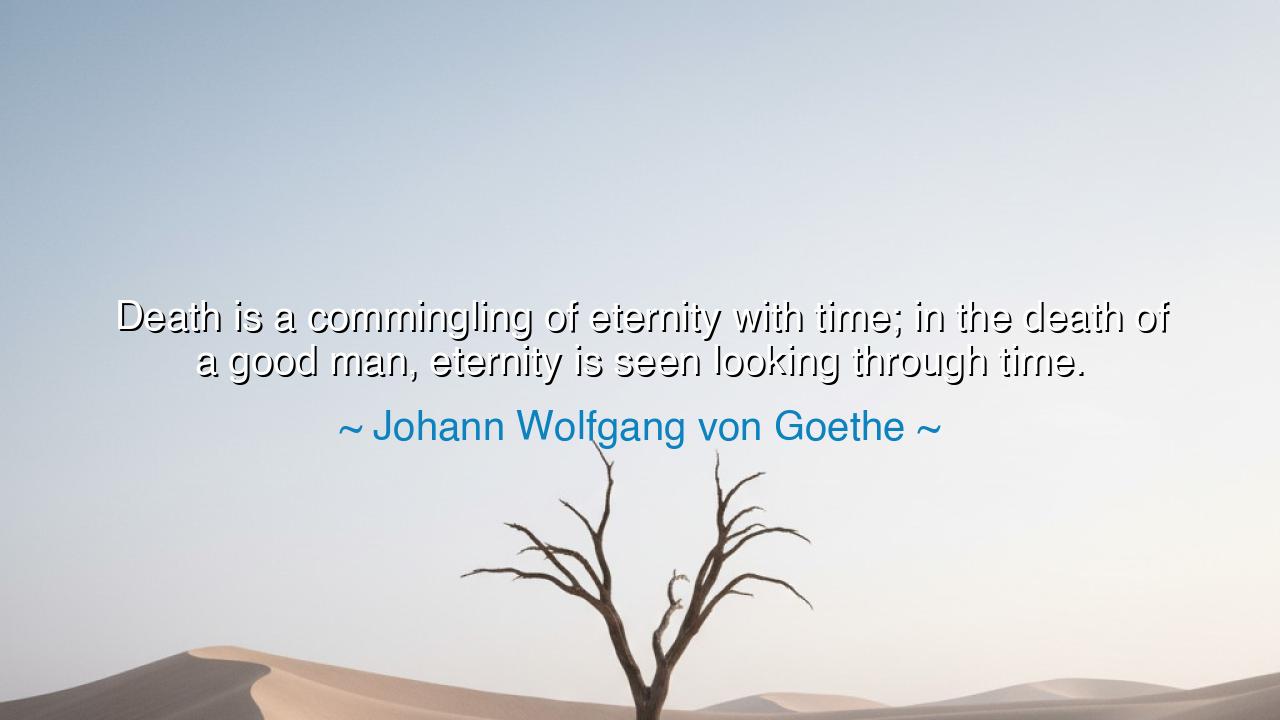
Death is a commingling of eternity with time; in the death of a
Death is a commingling of eternity with time; in the death of a good man, eternity is seen looking through time.






“Death is a commingling of eternity with time; in the death of a good man, eternity is seen looking through time.” — so spoke Johann Wolfgang von Goethe, sage of the Enlightenment, poet of the soul’s long journey. In this profound utterance, Goethe gazes upon death not as an end, but as a revelation — a sacred moment when the veil of mortality grows thin, and through it, eternity peers with solemn eyes. He tells us that in the passing of a good man, we glimpse something greater than decay or departure; we behold the fusion of the temporal and the divine, where the eternal spirit leans close enough for the living to feel its breath.
To the mind of Goethe, who dwelt as much in philosophy as in poetry, time and eternity are not enemies, but intertwined lovers — one fleeting, the other infinite, and their meeting is most visible at the threshold of death. For life, in his vision, is a river that flows through the land of time, and death is where that river merges with the vast and boundless sea of eternity. The good man, whose heart is pure and whose deeds are righteous, does not sink into the abyss, but instead becomes the shimmer upon that eternal sea — the reflection of divine light within the passing moment. His death, therefore, is not tragedy but transfiguration — a vision of timeless truth breaking into the mortal world.
Goethe’s words echo the wisdom of the ancients, who saw death as a sacred bridge between worlds. The Greeks believed that those who lived nobly were granted immortality in the memory of men and the favor of the gods. The sages of the East spoke of the soul’s liberation from the wheel of time, its merging into the eternal essence. Goethe, whose mind embraced both Western and Eastern thought, draws from this same well: he reminds us that in every good death, we are reminded that there is more to existence than the clock and the grave. When a life of virtue ends, it does not vanish — it expands, it reveals the eternal through the final act of the temporal.
Consider the death of Socrates, the philosopher who drank the hemlock with a tranquil heart. In that moment, his body bowed to time, but his spirit rose beyond it. He spoke calmly to his students, telling them that no true harm could befall a good man — neither in life nor in death. As he lay dying, eternity seemed to look through him; the wisdom that had guided his life became radiant in his passing. In the stillness of his final breath, the eternal truth he had pursued became visible to all who watched. Thus, as Goethe would say, in the death of a good man, eternity revealed itself, not as a concept, but as a presence.
This vision transforms how we ought to understand mortality. If death is indeed a commingling — a sacred meeting between time and eternity — then we must not live as if our days are isolated fragments, but as if each moment is preparing for that eternal encounter. The good man lives so that when his time ends, he leaves behind not despair but illumination — a memory, an example, a peace that whispers of something beyond the grave. His life, and his death, become a testimony that eternity is not elsewhere, but ever near, waiting to be seen through the purity of a well-lived life.
In this way, Goethe’s words are not merely philosophical; they are moral and spiritual instruction. He calls us to live well, to cultivate goodness, so that when our time arrives, our passing becomes not a fading, but a revelation. The way we live determines how eternity will be seen through us. When a soul departs in peace, when a life has been marked by kindness, truth, and courage, then those who remain are not only sorrowful — they are touched by the glimpse of the eternal. Such a death does not diminish the world; it enlarges it.
Therefore, my listener, take this teaching as both comfort and calling. Do not fear death, for it is not the annihilation of life, but its fulfillment — the moment when the eternal within you reveals itself through the finite. Live so that your days are worthy of that final unveiling. Let every act be done with goodness, every word with sincerity, every struggle with grace. For one day, when time meets eternity at the gate of your own life, may it be said of you as Goethe said of the righteous: “In his death, eternity was seen looking through time.”
And thus, remember always: to live rightly is to die beautifully, and to die beautifully is to reveal the eternal. Eternity waits not beyond life, but within it — hidden in the heart of the good, awaiting the hour when death shall lift the veil, and time itself shall bow before the immortal spirit.






AAdministratorAdministrator
Welcome, honored guests. Please leave a comment, we will respond soon